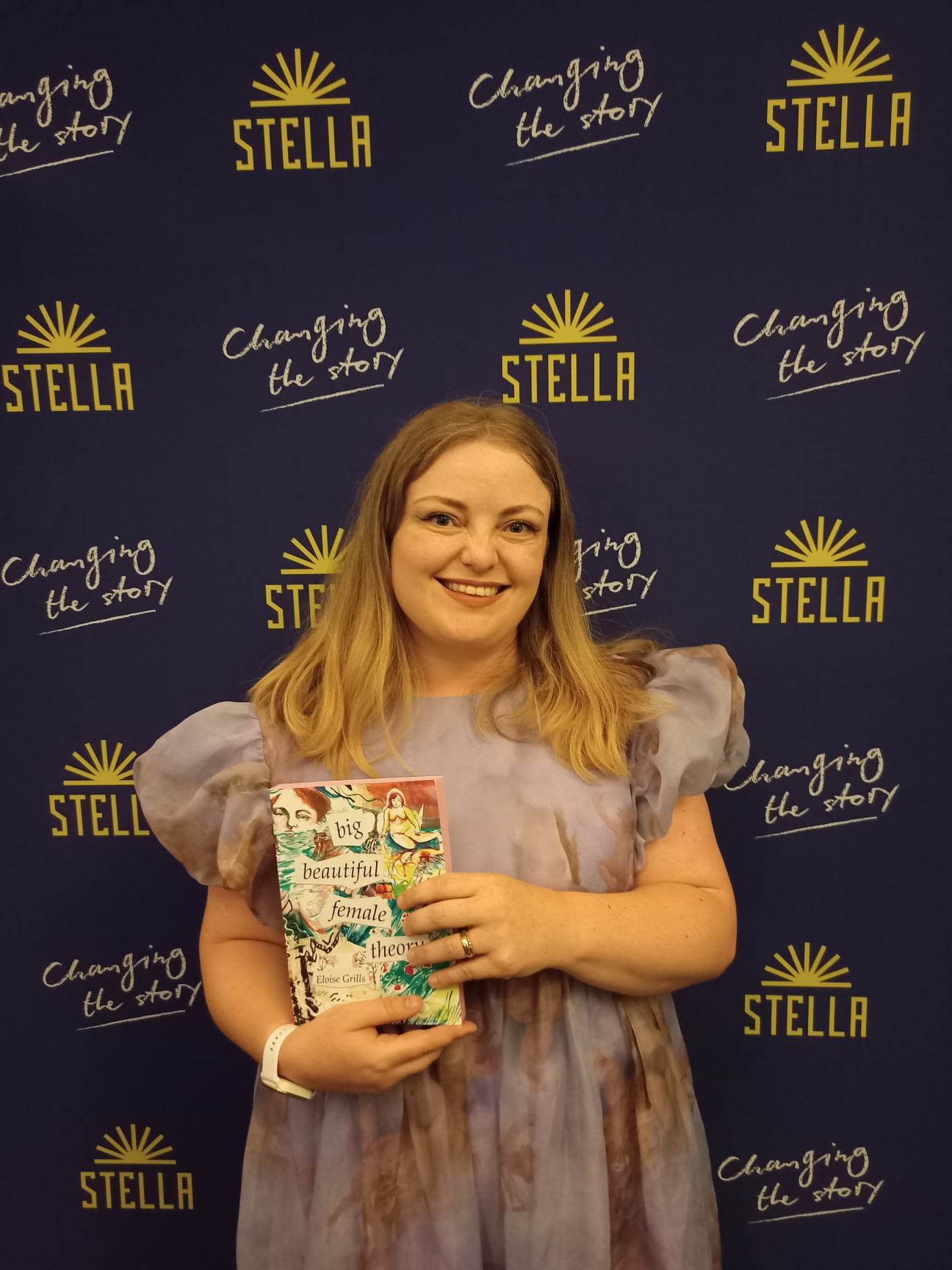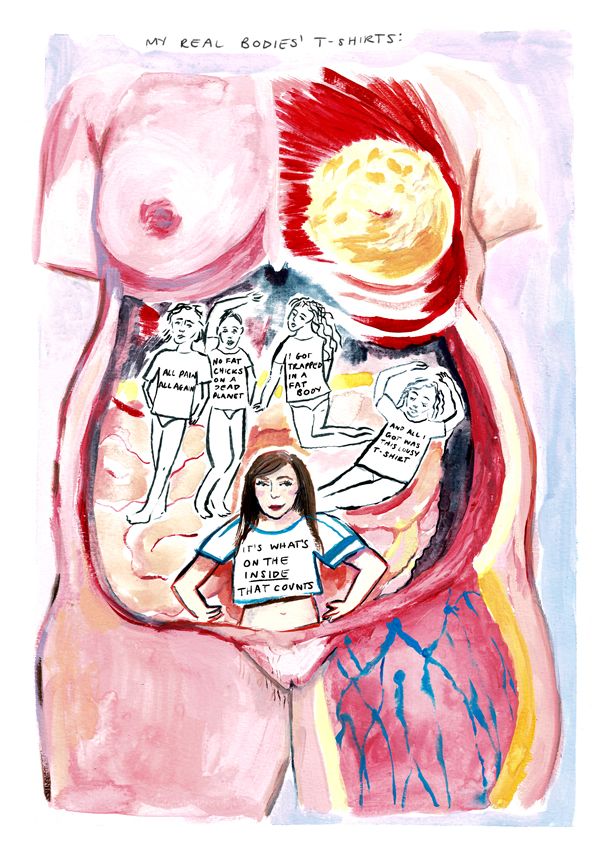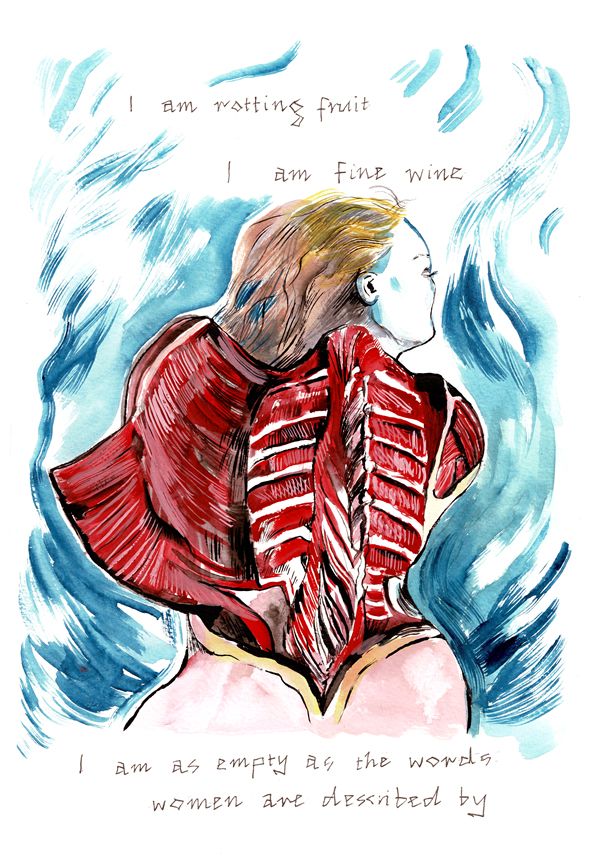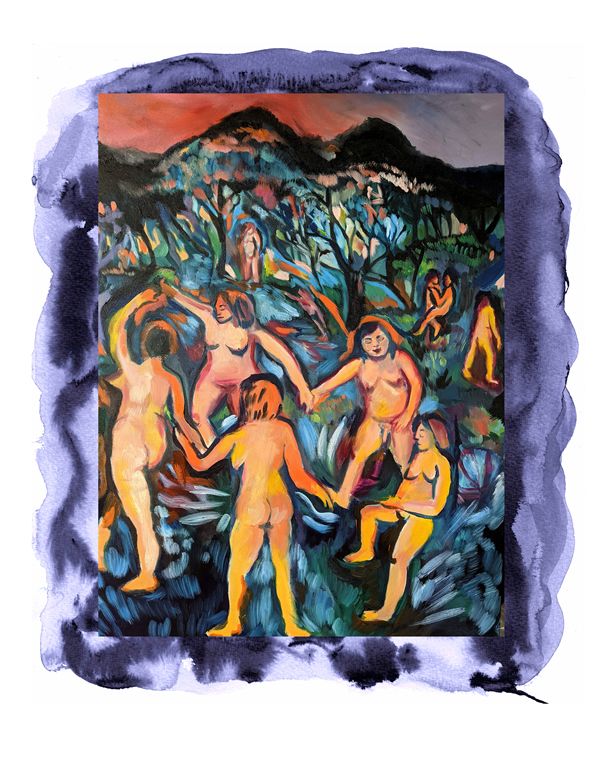Conversation IX
Or, big beautiful female theory with Eloise Grills.

Earlier this year, I had the opportunity to attend a writing workshop with the amazing Eloise Grills. What a talented young woman she is. Her most recent book, big beautiful female theory, was short-listed for the 2023 Stella Prize and I’ve seen it called a masterpiece on Twitter, which it surely is. She mixes media and formats – essay, poetry and art. I reviewed the book a couple of weeks ago if you’d like to know more about my response to it.
Eloise writes in the most personal way. She wrote a fabulous article in The Guardian about how she feels revealing so much of herself. She’s currently in Paris for a fellowship and is blogging about that experience on SubStack.
Eloise has graciously answered some questions for me for the blog, and she’s also shared some of her beautiful artwork. I’m just delighted to share them with you. And, as a woman who has been ‘big’ all of her life, and who is still struggling with self-acceptance, I’m just so grateful to have met Eloise and to have been inspired by her journey.
Enjoy this fabulous conversation! And thank you so much @grillzoid xo


Eloise, I’m in awe of your bravery. Your work is so personal and I can understand how terrifying it must be to have it out in the world. How does it feel now that the work is gaining more and more recognition? Have you had any backlash? And would you encourage other women to be similarly brave?
I honestly don’t think I’ve had any backlash, which is strange considering how personal my subject matter is. The strongest backlash I get is in my own head. And I certainly don’t feel brave – not most of the time, anyway. I often feel incredibly afraid and perhaps writing is a way to not feel so scared all the time. Or, to act despite this fear.
I definitely used to assume (back when I wrote zines and in small journals, etc), that no one read my work. Now that I have a book in the world, I definitely have to accept that I am no longer completely invisible, which has made my creative process a little less tenable, as I kind of thrive on that gravity-free state to write and draw without a feeling of judgement.
I would suggest that other women, or other people in general, write what they can’t stand not writing about, and see where that goes. I often find the thing I am most terrified to say is the thing that I most need to write about at that moment. And if not, then at least I’ve confronted some of my anxieties on the page.

What I love about big beautiful female theory is the way that it resonates with some of my own experiences living in a female body. I imagine that this is what it does for heaps of other women too and that recognising ourselves in you is one of the reasons for its success.
So firstly, I want to say thank you for sacrificing yourself on the altar of vulnerability for the rest of us. We appreciate it.
Can you share some of the feedback women give you about the book? Does this make the vulnerability worthwhile?
I have had a range of feedback. I generally feel like I am writing for a small audience: people who have felt a certain difficulty about their bodies or their experiences and who have felt very alone. People like me before I wrote this book.
I have seen some readings of the book, which I have found interesting, that I am entreating the reader to ‘like me’. I don’t think this is an incorrect reading, readers ultimately have their own interpretations which are possibly more accurate than what has been intended by the author. But I think the book is really an exploration of why I have felt the need to be likeable in my life, and as a chronic people pleaser how I can undo this, creatively. So, inherently, this has meant being 100% honest about myself, even when it has made me (and potentially a reader) uncomfortable. Holding back would feel antithetical to the project and in the end, I think the reader can take what they want from that. Love me or hate me, throw me in the garbage; I’m no longer attached to the outcome. I also think that I will probably protect myself a bit more with future projects, but for this one, this kind of unbarred self-exposure felt necessary to me.
It’s been wonderful to receive personal messages from people about their engagement with the book, and to have been able to hold space in that way. In particular, I have had quite a few people tell me they have given this book to younger adult people in their life and that they have really engaged with it and taken its neutrality towards bodies to heart. Which is the best feedback I could have had, really, and makes the work feel worthwhile.

Do you feel that the book has created a broader responsibility for you around feminism, body theory and for making us all feel a bit better about ourselves? Did creating this book make you the feminist that you want to be? Is that ever final? And will this work ever be complete?
Absolutely. I don’t think body neutrality or feminism is ever going to be a complete project. There are always things to strive for and change in our society. We can already see that in the hollow ways body positivity has been subsumed by capitalism to sell us more crap we don’t need.
While art has a role to play in changing attitudes, there are so many things that need to change; the medicalisation and dehumanisation against bodies of size needs to be confronted at more than a surface level.
I don’t think we will ever live in a utopian society where every person is equal. But I think every small battle on this front is important and will make life better, even if it is for one person at a time.
In the essay ‘The fat bitch in art’ there’s an illustration of you holding onto your “beloved book” and it reminded me a lot of the photo of you holding onto your book for the photo shoot for the Stella Prize shortlist. What is it like to receive this kind of external validation? Was it like a dream come true?
It’s wonderful to feel validation having the book published and to get some recognition for it through awards. It does make you feel like you’re not writing into the void. At the same time, I have felt a lot of discomfort around the attention I have received. I’m honestly kind of looking forward to retreating into my cave and creating without thinking about the outside world after this is all over!

I’m really interested in the way that creative people balance the realities of living (aka making money) and finding time and space for the creative process. Can you tell us about your process and how you get into flow, and stay there if possible? What gets in your way and how do you deal with that?
I think I have a bit of a problem with allowing myself to create if it’s not generating income in some way. A few years ago, I won a few prizes and got a couple of grants, and it was the first time that I was able to really take my work seriously. I was being paid to work, if that makes sense, so I was ‘allowed’ to do it.
Now those funding streams have kind of dried up and I’ve been thinking about the value of my work, regardless of generating income, as an important part of my life, regardless of it sometimes being a financial drain. I’ve realised I don’t need very much, materially, in this life to be happy, so in the last few years I’ve been giving myself a bit more of a break and not putting pressure on myself to be constantly hustling with my practice. Using other work (teaching, transcribing, disability arts tutoring) to supplement my creative practice.
What’s next for Eloise? Are you working on something else or are you giving yourself a nice big break?
I’ve recently accepted a PhD scholarship at RMIT, so that will take away some of the money worries for a few years at least, and I’m excited to be able to push myself beyond the scope of my current work, to look at different forms, to think about how I can build a more sustainable practice – I think it’s fairly common for early-mid career artists to burn out, so I’m wary of that.
I’m currently at a residency at the Cite Internationale Des Artes in Paris working on some research for a project. I’m a bit superstitious so I won’t say too much about it, other than it will be quite different to anything I’ve ever done! But of course, I’m also resting and eating croissants, spending time with my husband, drinking beers by the Seine… so there’s that!
------------
You can follow Eloise on Twitter at @grillzoid
